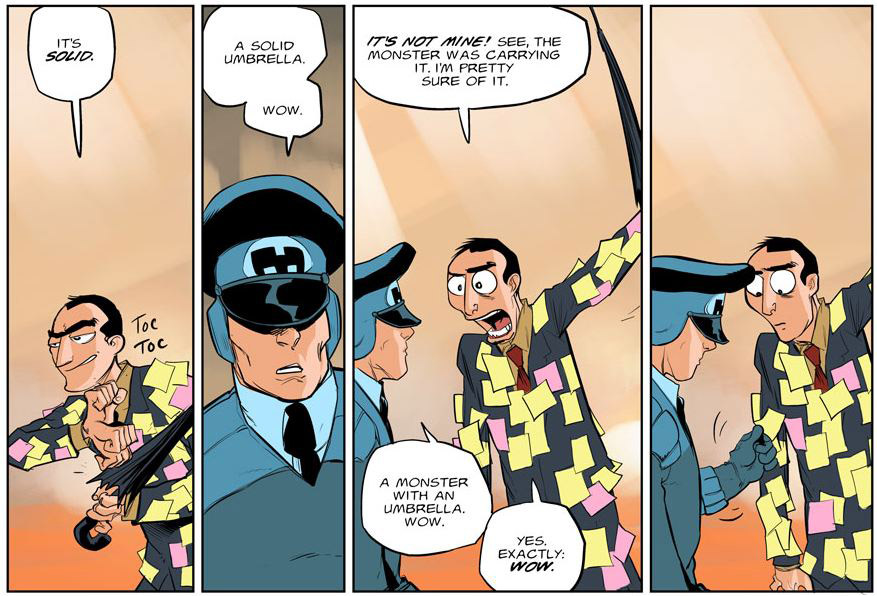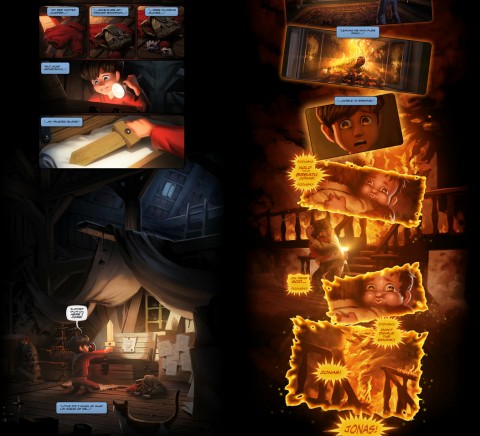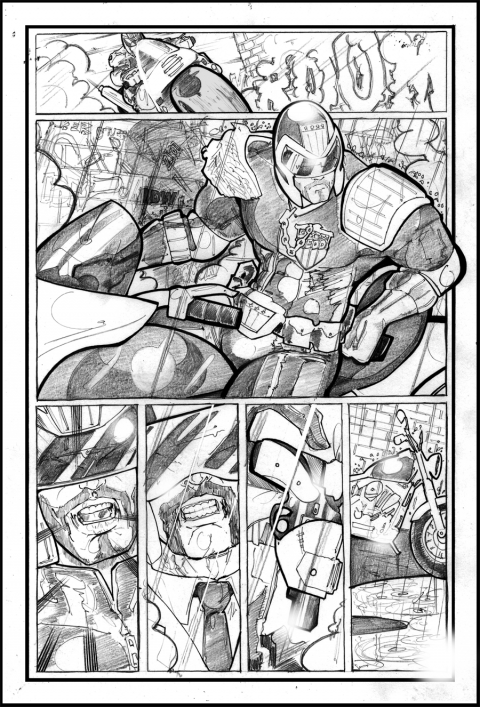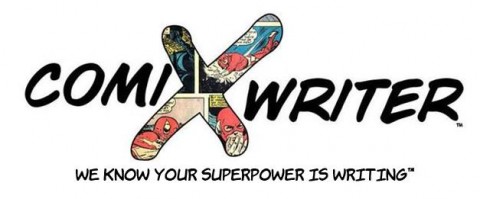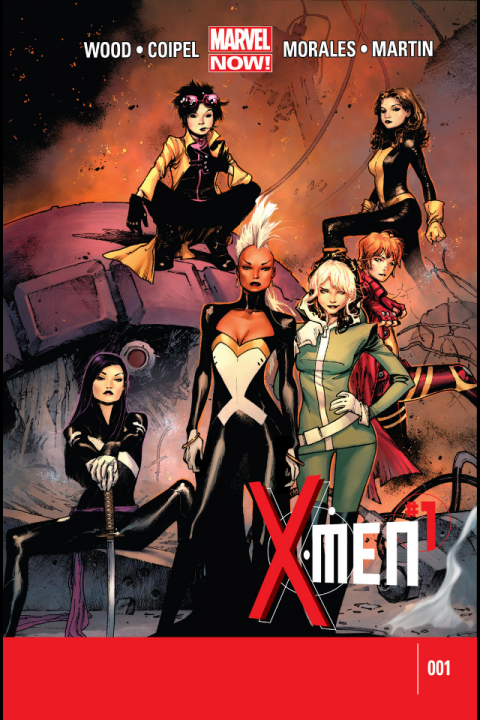The comics industry is a tough nut to crack for those who plan to squeeze inside it somehow. There’s no clear or obvious path towards a ‘job’ like there is in some industries. There’s no… “this much school”, “this degree”, “this much work experience” equals = Job. This is great for comics fans because it means we get the best possible new work, the work that stands out as ‘exceptional’ among the competition and warrants a shot on a mainstream title. As it should be. The very nature of the product requires the editors and publishers to be quite reactive in terms of their talent spotting. They obviously want to make the best-looking story they can and they wouldn’t want to hire an average artist or writer simply because they’ve got a certificate that says they’re good. It has to be the way it is to produce the best-looking books.
From the other side of the castle wall however, it makes the path towards scoring-a-job that bit more complicated. You could say it makes it that bit more ‘interesting’ too though, either way, with 2 industry pros working on the same mainstream project, the one thing you can be absolutely sure of is that they found their way to the project from very different places. Which again is cool… but tricky manufacture.
It boils down to talent, hard work and luck. The 3 elements required to make fire. You must strive for all 3 and you must arrive at all 3 in abundance to succeed. Just like any desirable job, there’s extremely fierce competition from plenty of talented hopefuls, all of whom probably wouldn’t think twice about stepping all over you to get where they want to be. It’s tough out there but… if it was easy, everyone would do it. Once you’ve touched and understood the scale of the daunting comics mountain standing before you, you may begin your assent, all the time working harder than everyone else around you, applying your spark of talent wherever you can and hoping for that little bit of luck along the way.
The internet has provided the perfect platform for wannabe comic creators to publish their work in a place where people can actually find it and actively search for it, and for very little money too. The best place to start maybe? Webcomics have certainly grown in their popularity and production in recent years and will no doubt continue to do so. There is even a living to be made in the management of your own webcomics website if you can gather and maintain a loyal interest from potential fans. If that does end up being the case and you’re making a living doing what you love… have you then ‘made it’? Interesting.
There are creators whom only want to work on screen and others who eventually want to distribute a printed product and are only working for the screen in the ‘meantime’, both will always be in demand from the people who read them so, there’s plenty of room for everyone.
Once you’ve identified the 3 elements required to succeed and if you’re still interested in trying, an end-goal must be realised. What do you want to achieve ultimately? Do you want to draw Spider-man and Batman? Do you want to write and draw your own book to print and hustle in the Indie market? Do you simply want to make a gag-a-day or ongoing ‘epic’ webcomic online? What’s the point where success happens?
For me, the goal is to make a solid living telling stories. Whether that’s for Marvel or DC or through any means of my own is almost irrelevant. I want to completely replace the pointless 8 hours wasted every day in a ‘real job’ with glorious time spent drawing pictures and telling stories and if I can do that… I’ll never work a day in my life. Apparently.
If you’ve identified your ‘end-goal’ and the elements required to achieve it, you now need to apply this to the real world and execute a plan. You must be trying to improve constantly. If you were good enough to be doing this now, you’d be doing it now. You must be studying the absolute best talent in the industry and you must be learning on your own. You obviously need to study storytelling. Obviously. This could easily be a whole other column of it’s own (note to self). You need to identify your weakest link and improve it dramatically. You must open the parameters for inspiration beyond graphic fiction. A well-defined understanding of film and literature is paramount and storytelling musicians are worth their weight in gold.
So, let’s say you’ve done — or are doing — all those things and you want to see what’s out there already in terms of webcomics, what’s my competition right off the bat? Well, just like mainstream printed comics there’s a lot of cr*p out there and also, just like the mainstream books, there’re some absolute gems. Please see CBD’s very own Webcomics Walkabout for a more regular insight.
My pick to share here is the Wormworld Saga by Daniel Lieske. Visually, it’s obviously a cut above the rest and really starts to explore the potential of how we engage with the content on-screen. It would almost be a shame to restrict this piece to a printed page, it’s so polished and pleasing to look at and should really be celebrated and shared among the comics community a lot more than it is. Creator Daniel Lieske is one of the more ‘business savvy’ creators and should be applauded for his approach. A pioneer among the ‘armature’ creators. Have a look and share your thoughts.
Things that have helped me to start my journey: Watching DVD commentary. The Animatrix. Alan Moore’s Writing For Comics. Lost. Dissecting and analysing the best written and best looking books in the industry. Reading the large format ‘how-to’ books cover to cover. Actually writing and drawing a whole story again and again. Studying on my own… storytelling, life drawing, Photoshop, web design etc. Reading everything from Shakespeare to Hemmingway to Beatrix Potter to autobiographies. Taking a story to print on my own to understand the publishing process fully, the logistics, legality and costs involved etc. Taking my work to shows and making the professionals tell me what’s wrong with it and then practising that one thing until it’s fixed. Submitting my work to the big publishers, their feedback can be invaluable. Working to strict deadlines and never giving up. Ever.
Baring in mind that I am currently nowhere near landing a ‘pro job’, this post doesn’t quite qualify as advice, see it more as a bunch stuff that I’ve noticed or tried already instead.
The final page of the current run on Celerity will be available on Saturday. If you do see it and read it, please leave a comment. If you like it or hate it or don’t care… but still read it, please do leave a comment. I’d really like to know what people think about it. Has anyone actually read it? And does anyone genuinely want to keep reading it? Let me know.
Stream of consciousness.

